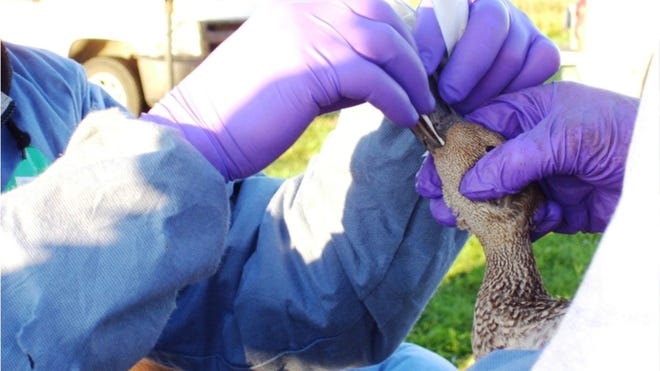St. Francis Wildlife stops taking birds after flu found in Tallahassee

Because of the Extremely Pathogenic Avian Influenza (HPAI), our nearby wildlife rehabilitation centre, St. Francis Wildlife, briefly will not acknowledge hurt, orphaned or ill wild birds. HPAI has just been verified in a duck that was introduced to St. Francis Wildlife in Quincy, Florida.
Verified and presumptive circumstances of HPAI have just lately been documented along the East Coastline of Florida from Palm Beach front County to Duval County and on the West Coastline in Charlotte County.
Infected birds have been aquatic species (ducks, gulls, herons, terns and pelicans), raptors (excellent horned owls and bald eagles) and scavengers (vultures). Birds on their northern spring migration could have carried the virus into our space.
Looking:‘Toxic lead’: How a lawsuit could curb looking, fishing in St. Marks National Wildlife Refuge
Wildlife:Wildlife professional answers issues about COVID-19 and white-tailed deer
Final yr, the Really Pathogenic Avian Influenza traveled from Europe into Canada. Then migratory waterfowl carried it down the Atlantic Flyway, infecting birds alongside the way.

An unprecedented outbreak
Two months ago, on Jan. 22, when a hunter confirmed up at a boat ramp in Palm Seashore County with two blue-winged teal ducks, a USDA-Wildlife Products and services staff swabbed them. No just one suspected the birds had been unwell it was just routine surveillance. Their tests were good for HPAI.
In February, dozens of lifeless lesser scaup ducks and other aquatic species, as perfectly as birds that scarfed up these free of charge meals — black vultures, bald eagles and great horned owls — were being discovered together Florida’s east coastline and in Charlotte County with this extremely infectious new chook flu. It was claimed that wildlife officials suspect there are “hundreds additional” unconfirmed circumstances.
Some infected birds may possibly be asymptomatic even though other folks appear lethargic or present neurologic signs this kind of as circling, tremors and seizures. Normally birds are located useless with no signals of trauma or other leads to.
This latest outbreak of HPAI in Florida’s wild birds is unparalleled. And also very unsettling for Florida’s wildlife rehabilitators who treatment for countless numbers of injured, orphaned and sick wild animals each year but hardly ever experienced everything like this.

Situation confirmed in Tallahassee duck
On Feb. 25, a female on her morning commute to get the job done found a duck in the center of Georgia Avenue in Tallahassee. She stopped to verify on it. Seemingly injured, it did not fly away.
She was capable to seize it and consider it to nearby Northwood Animal Medical center. St. Francis Wildlife picked it up from there admitted the fowl, a lesser scaup, to our wildlife hospital and started cure for its injured leg.
When we have been alerted that migratory birds might be carrying the incredibly contagious virus as they flew back to their summer season breeding territory — and we had been on a flyway, our wildlife rehabilitator swabbed the duck and sent the sample to a Florida lab.

St. Francis is briefly not accepting wild birds
Since HPAI is highly contagious and untreatable, St. Francis Wildlife and our two Tallahassee veterinary partners, Northwood and Allied Veterinary Hospitals, are quickly not accepting any wild birds.
In 44 yrs, we’ve by no means turned away an hurt, orphaned or sick wild animal, so we are deeply upset to be unable to aid area birds in want at this time. But we ought to do all we can to assist handle this critical outbreak.
If you uncover a wild chook in need of assistance, contact FWC Dispatch: 850-245-7716 or FWC 24-hour hotline: 888-404-3922. To stop the distribute of HPAI, do not tackle a sick or lifeless fowl, retain pets away and report it to FWC immediately so it can be analyzed for HPAI. Visit app.myfwc.com/FWRI/AvianMortality/.
This virus can unfold by way of immediate contact with contaminated birds or a contaminated floor, on which it can continue being active for a long time.
All present avian clients at St. Francis Wildlife are becoming examined, each and every floor is getting disinfected and protocols for working with this initial-of-its-form outbreak in Florida are currently being ready with the help of condition and countrywide wildlife authorities.

People today who retain domestic birds
This virus, which is shed by all excretions (saliva, nasal secretions and feces), is highly transmissible to domestic chickens, ducks, turkeys, etc. and is typically deadly.
The American Veterinary Clinical Affiliation endorses maintaining birds indoors or in sheltered enclosures if HPAI is determined in your spot. Locate songbird feeders away from chickens and pet birds.
Men and women who preserve hen feeders
HPAI is not very easily transmissible from birds to folks, and, to date, there have been no recognised human bacterial infections in North The usa. Songbirds are generally at reduced danger for internet hosting avian influenza nevertheless, it is however attainable that they could have and/or transmit this pathogen.
To help prevent the distribute of this virus, individuals who feed birds should observe typical-perception safeguards:
- Clean and disinfect bird feeders and baths each individual week with a option of nine areas water to one particular portion bleach, rinse nicely and dry ahead of refilling.
- Don disposable gloves even though cleansing and then wash your wash arms with cleaning soap and water.
Wild mammals and reptiles
St. Francis Wildlife and our two veterinary partners in Tallahassee (Northwood and Allied Animal Hospitals) will keep on to acknowledge mammal and reptile species, though Northwood no longer accepts Rabies Vector Species (RVS) these kinds of as raccoons, foxes, skunks and bats.
If you discover an RVS, be sure to do not handle it connect with St. Francis Wildlife at 850-627-4151. Florida’s squirrels, opossums and rabbits are rarely rabies vectors.

What to do if you obtain a chicken
If you discover a wild fowl in need of support, phone FWC Dispatch: 850-245-7716 or FWC 24-hour hotline: 888-404-3922. To protect against the spread of HPAI, do not cope with a sick or dead chicken, retain animals away and report it to FWC promptly so it can be examined for HPAI. Visit app.myfwc.com/FWRI/AvianMortality/.
For updates on this developing predicament as effectively as common information and facts about what to do if you come across wildlife in want, remember to verify the St. Francis Wildlife website, stfranciswildlife.org, our Fb site, fb.com/Wildlife.Issues.to.Florida and the Florida Fish & Wildlife Conservation Fee Avian Influenza web page, myfwc.com/analysis/wildlife/well being/avian/influenza.
Sandy Beck is the education and learning director for St. Francis Wildlife. Contact her at [email protected].
Never miss out on a story: Subscribe to the Tallahassee Democrat applying the link at the best of the site.








